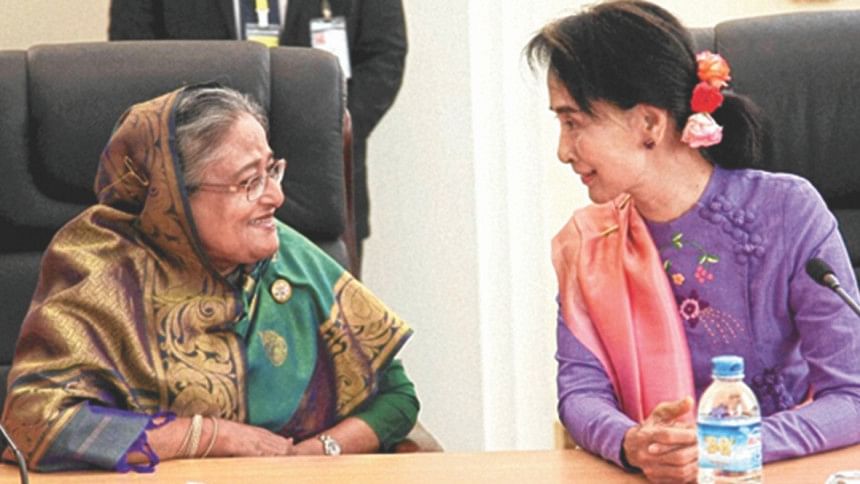Mapping new directions

Trust deficit has been a major constraint in elevating Bangladesh-Myanmar relations. In fact, due to the trust deficit and lack of political will, Bangladesh-Myanmar relations could not enjoy the level of amity at both at the state and people-to-people level. It is critical to promote people-to-people contacts, academic and media cooperation, increasing socio-cultural exchange programmes, opening up minds towards each other and sharing knowledge.
Despite the possibilities for cooperation, positive interactions between Bangladesh and Myanmar have been rare, slow to develop, and have often been limited to formal or symbolic actions rather than substantive engagements. As a result, trade between the two countries has been negligible. But, geographical proximity offers huge scope for growing bilateral trade and investment which needs to be utilised for the greater interests of the people of both countries.
The volume of annual bilateral trade between Bangladesh and Myanmar amounts to USD 100 million only while India's bilateral trade with Myanmar stood at USD 2.18 billion in 2013-2014. In fact, Bangladesh's bilateral trade can be increased manifold if proper long term policies are taken to harness the untapped trade potential.
At this point, keeping aside thorny issues like the Rohingya issue, trade and connectivity needs to be prioritised. It is a positive sign that Rakhaine traders have already asked the Union government of Myanmar to provide more than 1 billion kyat to complete a trading zone on its border to boost bilateral trade volume with Bangladesh by the end of 2016 (Htwe 2016). According to Rakhaine local businessmen, if implemented, the zone will allow local companies to rebuild trade ties with neighbouring Bangladesh and beyond. In addition, considering Myanmar's abundant land and market, some Bangladeshi industries can be relocated to Myanmar.
Bangladesh needs to increase its investment basket in Myanmar in sectors like agriculture, energy, pharmaceuticals, information technology, ready-made garments, and hotel industries. Contract farming can be a new area of cooperation considering the vast scale of arable land in Myanmar.
In addition, only 12 percent of total land area in Myanmar is under cultivation and the liberal policy of leasing out land offers a great opportunity for Bangladesh to introduce contract farming with Myanmar. According to the Ministry of Foreign Affairs, Republic of Myanmar, foreign investors are allowed to use up to 50,000 acres of uncultivated land by the land regulation for agricultural purposes (Ministry of Foreign Affairs, Republic of Myanmar n.d). In fact, considering the future food security of Bangladesh and its sole dependence on India, contract farming with Myanmar can be a good alternative.
Myanmar is endowed with various natural resources including gas, limestone, timber, and varieties of marine products. For instance, in June 8, 2013 Roben Farzad reported in Bloomberg that Myanmar has 7.8 trillion cubic feet of proven natural gas reserves (Farzad, June 8, 2013). According to the former foreign minister of Bangladesh Dipu Moni, a company in Myanmar was interested in setting up a 500-megawatt hydroelectric plant in Rakhine state to sell electricity to Bangladesh (The Daily Star, June 12, 2009). Such opportunities should be utilised. In addition, the present government of Myanmar welcomes foreign investors to invest in their energy sector.
Connectivity works as an important catalyst to deepen ties. In fact, it is argued that connectivity through sea, air, road, rail and banking will automatically remove gaps in Bangladesh and Myanmar relations. Though Bangladesh and Myanmar are close neighbours, the absence of connectivity is an issue.
Notably, when Myanmar opened its doors to foreign investors in 2010, many businesses set up their firms there. Biman Bangladesh too has started running direct flights between Dhaka-Yangon. Novoair, a private airliner of Bangladesh, launched its maiden international flight on the Dhaka-Yangon route on December 1, 2015. It is expected that this will facilitate trade and business.
Though Bangladesh-Myanmar share historical ties, the people of Bangladesh and Myanmar know very little about each other. The long-standing Rohingya problem has also contributed to building distance between these two countries and its people.
The launching of direct flights is, thus, an important step towards improving relations. Tourism through official channels should be promoted. A culture of trust and friendship should be built between the two countries.
For a sustainable partnership, Bangladesh-Myanmar needs to promote cooperation at the academic level. Against this backdrop, memorandum of understandings (MoUs) between Universities and think tanks merit serious attention. Academic exchange programmes, MoUs and joint research projects are also critical in boosting relations between the two countries over the coming days.
Though Myanmar is an important country for Bangladesh, it is ironic that knowledge about Myanmar remains so little in Bangladesh. Hardly any scholarly work is found for instance, and people, whether in theory or in policy, hold next to no knowledge regarding Myanmar. In the 21st century, where knowledge is the cornerstone of societal prosperity, Bangladesh is seriously lagging behind. Thus, establishing a 'Myanmar Study Centre' in Bangladesh and introducing separate course on 'Myanmar Affairs' is important.
The prospects identified should be considered for improving Bangladesh-Myanmar relations. And to take the relation between the two countries to new heights, both governments should take into account the interest of its counterpart, especially in its foreign policy formulations.
The writer is an Assistant Professor in International Relations at the University of Rajshahi.
E-mail: [email protected]

 For all latest news, follow The Daily Star's Google News channel.
For all latest news, follow The Daily Star's Google News channel. 



Comments